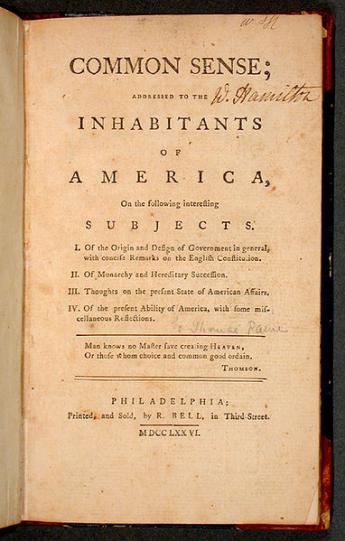Tip Antiquarian Booksellers' Association of America Lighthouse Books, ABAA
Collecting Rare Books and First Editions - Thomas Paine

By Michael Slicker
January 29 is the birthday of early American political activist Thomas Paine (1737), whose pamphlet Common Sense (1776) credited with inspiring American colonists to embrace the idea of independence from Great Britain. The American Revolution had already started but the work served to spur volunteers for the Continental Army. It was widely distributed throughout the colonies, read aloud in taverns, and unabashedly pirated. Some scholars say it was the first American bestseller.
A pamphlet series, The American Crisis (1776-1783), was first published in December of 1776, and served as inspiration to citizen soldiers fighting the British Army. George Washington had the first in the series read to his troops. That's the one that begins "These are the times that try men's souls: the summer soldier and the sunshine patriot will, in this crisis, shrink from the service of their country …"
Paine, who was born Thomas Pain and evidently added the "e" to the end himself, didn't start out as a revolutionary writer. He trained as a corset maker (his father's trade) and later had a shop of his own. The politics came later. In his mid 30s, while working as a excise officer, Paine wrote his first political piece, a 21-page article making a case to Parliament for better pay and working conditions for those in his profession.
Eventually, Paine had his own tobacco shop but it went out of business and Paine sold everything to stay out of debtor's prison. He moved to London, where a mutual friend introduced him to Benjamin Franklin. It was Franklin who helped him emigrate to the colonies. He did so in 1774, but the voyage was so arduous that Paine arrived quite ill and had to be carried off the ship. Within a few months, though, he had recovered and he became editor of Pennsylvania Magazine.
In the early days of the republic, Paine took a role in negotiating loans from France to aid the fledgling United States. During his time in Paris, he lived with political activist Nicholas Bonneville and his wife and children. Later, he helped Bonneville's family get to America. Eventually, Bonneville joined them and lived for a time in America. In 1818, Bonneville returned to Paris and opened a bookshop.
Paine also wrote Rights of Man (1791), a treatise in support of the French Revolution. It makes the case that if the government doesn't safeguard the people and their natural rights, then popular political revolution is permissible.
***
Posted on the Lighthouse Books Blog, presented here by permission of the author. Picture: Wikipedia.
